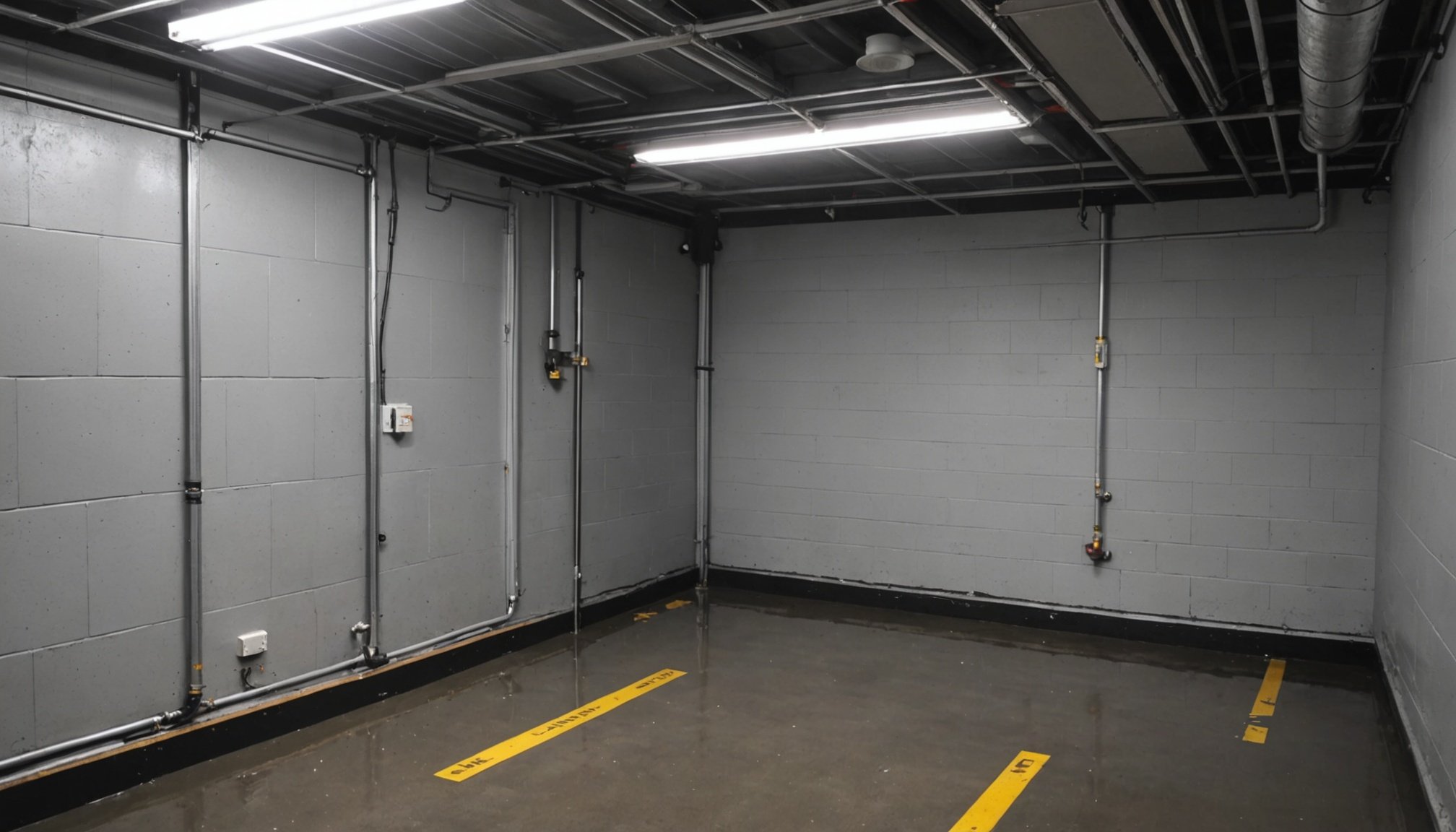Understanding Basement Waterproofing
Basement waterproofing is crucial for UK homes due to the region’s unpredictable weather patterns. Persistent rain can lead to water ingress, affecting the structural integrity of homes and causing dampness, mould, and other damages. Such problems can compromise both the value and safety of a property. Therefore, understanding the importance of waterproofing is not just about preventing immediate damage but ensuring long-term resilience and habitability.
Water ingress can contribute to various issues. Among these are weakened foundations, increased heating costs, and potential health risks from poor air quality due to mould. Addressing these problems proactively through effective waterproofing can save homeowners significant trouble and expense over time.
In the same genre : Mastering Seasonal Allergy Relief: Top Tips for Indoor Plant Management in Your London Apartment
Implementing a reliable basement waterproofing solution offers several benefits. These include:
- Enhanced property value
- Improved living conditions through moisture control
- Reduced likelihood of costly repairs.
Finding the right waterproofing method involves balancing between interior and exterior strategies. UK homes often benefit from combining these approaches for comprehensive protection. By prioritising effective solutions and regular maintenance, homeowners can enjoy a drier, safer living environment. In addition, understanding product options further aids in tailoring the perfect strategy for one’s home.
Also to discover : Maximizing Space: Top Strategies for Organizing Digital Home Entertainment in a Cozy Swansea Flat
Interior Waterproofing Techniques
For those tackling interior waterproofing, common methods include the use of sealants and membranes to protect against moisture. These solutions are essential for preventing water from penetrating walls and floors, thereby preserving the structural integrity of a basement.
Sealants and Membranes
Basement sealing often involves applying specific products directly onto surfaces. Sealants, like epoxy or polyurethane, form a protective layer that blocks water ingress. On the other hand, waterproofing membranes are sheets of material that create a durable barrier, effectively keeping moisture out. Both these methods can be valuable, though they may require occasional reapplication or inspection to ensure ongoing efficacy.
Recommended Products
When choosing waterproofing products, it’s crucial to select ones tailored for your specific needs. Look for options designed for longevity and resilience. Some popular selections include liquid rubber membrane coatings and acrylic-based sealers known for their adhesive properties.
Implementation Steps
Start with an inspection to identify all entry points for moisture. Clean surfaces thoroughly before applying any product. Follow the manufacturer’s guidelines for drying times and application techniques. Consistent maintenance can significantly increase the longevity of basement sealing efforts, offering peace of mind against future water issues.
Exterior Waterproofing Strategies
Exterior waterproofing is vital for preventing water ingress and protecting UK homes. It involves implementing systems and strategies that divert water away from a home’s foundation, thus reducing the risk of structural damage.
Effective Exterior Waterproofing Options
Effective exterior waterproofing methods include utilizing proper drainage systems and optimal landscaping solutions. One common technique is installing a French drain, which uses a gravel-filled trench and perforated pipe to divert water away. Enhanced gutter systems can also be employed to direct rainwater from roofs to designated drainage areas. Landscaping that slopes away from the foundation helps as well, mitigating water pooling near the home.
Importance of Proper Drainage Systems
The importance of effective drainage systems cannot be overstated. Without them, water can accumulate around the foundation, leading to cracks and other damages. Proper drainage averts these issues by ensuring water is efficiently channeled away, fortifying the property’s groundwork.
Case Studies Highlighting Success
Several case studies indicate the success of robust exterior waterproofing projects. For example, a study in a London suburb demonstrated that homes with well-installed French drains experienced significantly fewer water issues, illustrating the importance of integrating effective exterior waterproofing solutions for long-term safety and home value maintenance.
Navigating Common Challenges and Regulations
Basement waterproofing in UK homes comes with unique challenges and regulatory requirements that homeowners must consider. One common issue is dealing with older properties where materials and construction methods complicate waterproofing efforts. For example, traditional brickwork might allow more moisture ingress compared to modern materials. Solutions often need to be tailored, taking into account the home’s age and structure.
When it comes to UK regulations, homeowners must adhere to local building codes to ensure not only safety but also compliance. Building regulations often dictate specific standards for drainage systems, water ingress prevention methods, and suitable materials. Failing to meet these requirements can result in penalties or the need for costly adjustments.
To navigate these challenges effectively, it’s crucial to engage with professionals who understand the complexities of UK building codes and basement waterproofing challenges. Hiring experienced contractors can help in ensuring that the chosen waterproofing approach is both compliant and effective. Additionally, homeowners should consult with local councils for guidance on necessary permissions and standards, thus ensuring a successful and legally sound waterproofing project.
Choosing the Right Waterproofing Products
Selecting effective waterproofing products is crucial for safeguarding basements in UK homes. Understanding the variety of options available can help homeowners make informed decisions. Products can be broadly divided into professional-grade solutions and DIY options, each with distinct features and benefits.
Professional-grade solutions, such as high-end polyurethane membranes and epoxy sealants, are designed for longevity and resilience. These are ideal for severe water ingress issues, offering robust protection and requiring less frequent maintenance. Despite their higher upfront cost, they can prove cost-effective in the long run due to their durability.
On the other hand, DIY waterproofing products, like liquid rubber and acrylic-based sealers, are easier to apply and more budget-friendly. These are suitable for minor issues or as preventive measures. Homeowners should consider their waterproofing needs, skill level, and budget when choosing between these options.
When selecting waterproofing products for a basement, consider factors such as the severity of water ingress, the age of the building, and the local UK homes construction materials. By evaluating these elements, homeowners can ensure they choose the most appropriate products for their specific scenario.
Frequently Asked Questions about Basement Waterproofing
When it comes to basement waterproofing, many homeowners have concerns about its necessity and effectiveness. One common question is: Why is waterproofing crucial for UK homes? The unpredictable weather and frequent rainfall in the UK make waterproofing essential to prevent water ingress, which can cause structural damage, dampness, and health issues like mould.
Misconceptions often surround the effectiveness of specific waterproofing products. Are professional-grade solutions better than DIY options? Generally, professional-grade solutions provide more robust protection and longevity, especially for severe issues. DIY products can be a cost-effective choice for minor concerns but may require frequent maintenance.
Another frequent inquiry is: How can one ensure the longevity of waterproofing efforts? Regular maintenance is key. Homeowners should inspect basement sealing periodically and reapply products as needed to ensure ongoing efficacy. Keeping drainage systems clear is also critical to preventing future water issues.
Finally, dealing with basement waterproofing challenges requires awareness of UK regulations. Consulting professionals can help ensure compliance with building codes while addressing unique challenges in your property, safeguarding against unforeseen complications.











